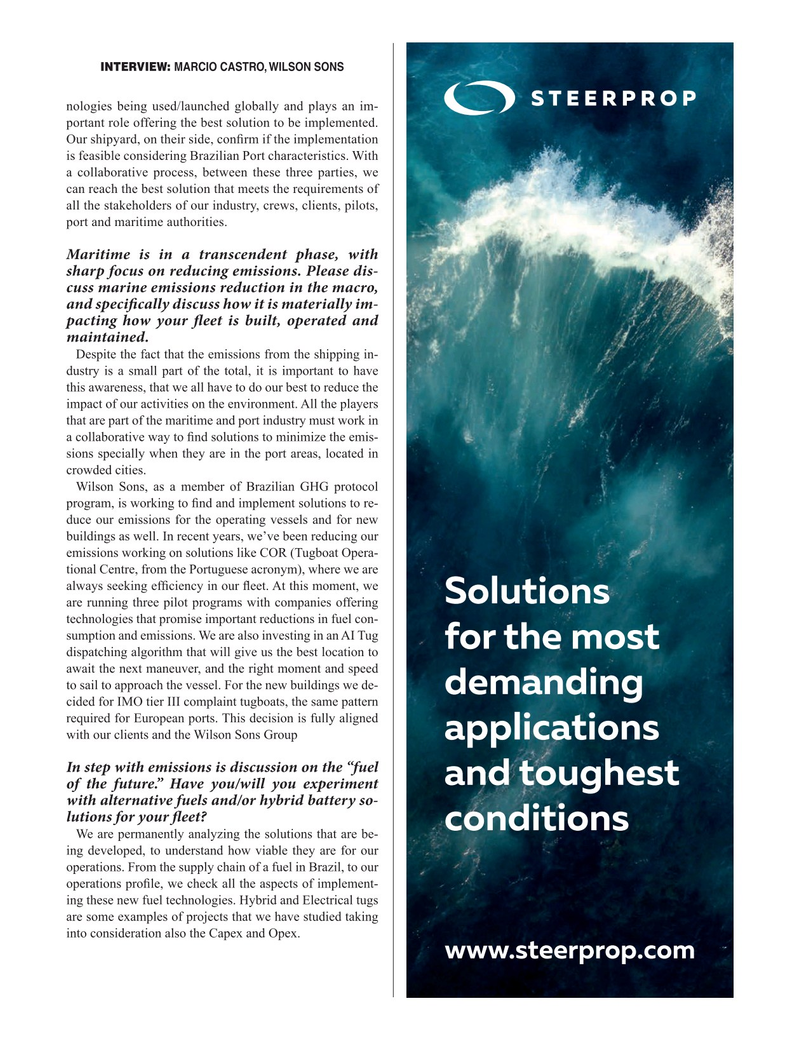
Page 41: of Maritime Reporter Magazine (November 2020)
Workboat Edition
Read this page in Pdf, Flash or Html5 edition of November 2020 Maritime Reporter Magazine
INTERVIEW: MARCIO CASTRO, WILSON SONS nologies being used/launched globally and plays an im- portant role offering the best solution to be implemented.
Our shipyard, on their side, con? rm if the implementation is feasible considering Brazilian Port characteristics. With a collaborative process, between these three parties, we can reach the best solution that meets the requirements of all the stakeholders of our industry, crews, clients, pilots, port and maritime authorities.
Maritime is in a transcendent phase, with sharp focus on reducing emissions. Please dis- cuss marine emissions reduction in the macro, and specif cally discuss how it is materially im- pacting how your f eet is built, operated and maintained.
Despite the fact that the emissions from the shipping in- dustry is a small part of the total, it is important to have this awareness, that we all have to do our best to reduce the impact of our activities on the environment. All the players that are part of the maritime and port industry must work in a collaborative way to ? nd solutions to minimize the emis- sions specially when they are in the port areas, located in crowded cities.
Wilson Sons, as a member of Brazilian GHG protocol program, is working to ? nd and implement solutions to re- duce our emissions for the operating vessels and for new buildings as well. In recent years, we’ve been reducing our emissions working on solutions like COR (Tugboat Opera- tional Centre, from the Portuguese acronym), where we are always seeking ef? ciency in our ? eet. At this moment, we
Solutions are running three pilot programs with companies offering technologies that promise important reductions in fuel con- sumption and emissions. We are also investing in an AI Tug for the most dispatching algorithm that will give us the best location to await the next maneuver, and the right moment and speed to sail to approach the vessel. For the new buildings we de- demanding cided for IMO tier III complaint tugboats, the same pattern required for European ports. This decision is fully aligned with our clients and the Wilson Sons Group applications
In step with emissions is discussion on the “fuel and toughest of the future.” Have you/will you experiment with alternative fuels and/or hybrid battery so- lutions for your f eet? conditions
We are permanently analyzing the solutions that are be- ing developed, to understand how viable they are for our operations. From the supply chain of a fuel in Brazil, to our operations pro? le, we check all the aspects of implement- ing these new fuel technologies. Hybrid and Electrical tugs are some examples of projects that we have studied taking into consideration also the Capex and Opex. www.steerprop.com
MR #11 (34-49).indd 41 11/9/2020 10:43:47 AM

 40
40

 42
42
